CDC Features
Current Features
People with Disabilities Can Lead Long, Healthy Lives
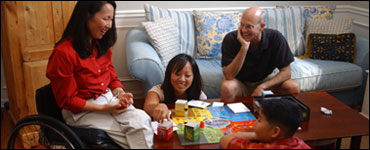
Today, about 50 million Americans, or one in five people, are living with at least one disability, and most Americans will experience a disability some time during the course of their lives. The Surgeon General's Call to Action to Improve the Health and Wellness of Persons with Disabilities encourages Americans to help increase the quality of life for people with disabilities through better health care and understanding. The following information from The Surgeon General's Call to Action to Improve the Health and Wellness of Persons with Disabilities: What It Means to You, also called the “People’s Piece,” provides helpful ways to improve everyone’s knowledge about the health and wellness of people with disabilities.
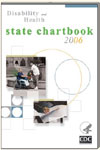
The Disability and Health State Chartbook (2006) is the first in a series to present information about the health of people with disabilities by state and territory. It has three purposes: 1) to show that a large percentage of adults have a disability, 2) to show that the health of people with disabilities tends to be poorer than that of the people without disabilities, and 3) to highlight areas in which public health systems can better target people with disabilities in their programs.
The information in this book can be used by people with disabilities, their family members, policy makers, health professionals, disability service providers, and others interested in the health and well-being of people with disabilities. You can download the state profiles and the Chartbook to learn more.
Anyone can have a disability —
• Some people are born with a disability.
• Some people get hurt or sick and have a disability as a result.
• Some people develop a disability as they age.
• Some people have a disability that lasts a short time. Other people have a disability that lasts a lifetime.
Different kinds of disabilities affect people in different ways. And the same disability can affect each person differently.
People with disabilities go to school and attend places of worship. They also vote, marry, have children, work, and play. To do all these things, people with disabilities need health care and health programs for the same reasons anyone else does—to stay well, active, and a part of the community.
Improving the Health and Wellness of People with Disabilities
You can do a lot to improve the health and wellness of people with disabilities. For instance, you can:
• See the whole person, not just the disability.
• Speak directly with the person with a disability, rather than through a third party.
• Speak with adults as adults, and children as children.
• Ask the person with a disability if he or she needs any help. Do not assume help is needed.
• Be aware and patient of the extra time it might take a person with a disability to speak or act.
• Respect what a person with a disability can do. See the ability in disability.
• Understand that not having access to work, school, health care, or fun things to do can cause more problems than a disability itself.
• Be the person who makes a difference.
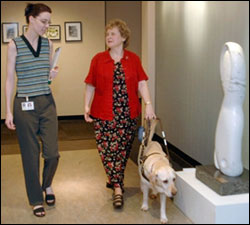
Leading a Long, Healthy Life
People with disabilities need health care and health programs for the same reasons anyone else does—to stay well, active, and a part of the community.
Having a disability does not mean you can’t be healthy.
Being healthy means the same thing for all of us—getting and staying well so we can lead full, active lives. That means having the tools and information to make healthy choices, and knowing the risk factors for illness. For people with disabilities, it also means knowing that problems related to a disability can be treated. These problems can include pain, depression, and a greater risk for certain illnesses. To be healthy, people with disabilities require health care that meets their needs as a whole person, not just as a person with a disability.
People with or without disabilities can stay healthy by learning about and living healthy lifestyles.
What You Can Do
There are also many things you can do to make sure you are getting the best possible health care:
• Know your body, how you feel when you’re well and when you’re not.
• Talk openly with your health care professional about your concerns.
• Find out who the best health care professionals are in your area to meet your needs.
• Check to be sure you can get into your health care professional’s office and that he or she has the staff and equipment you need.
• Think through your concerns before you visit your health care professional.
• Bring your health records with you.
• Take a friend with you, if you’re concerned you might not remember all your questions and all the answers.
• Get it in writing. Write down, or have someone write down for you, what is said by the health care professional.
• Ask for help finding more information through materials like brochures, or at specific Web pages on the Internet.
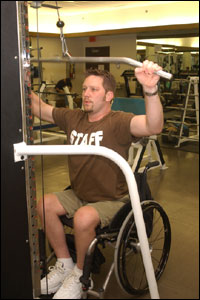
Tips for Leading a Long and Healthy Life
It’s never too late to form healthy habits. Here are some tips to get you started:
• Eat healthy foods in healthy portions.
• Be physically active every day.
• Don’t get too much sun.
• Get regular checkups.
• Don’t smoke or use illegal drugs.
• Use medicines wisely.
• If you drink alcohol, drink it in moderation.
• Stay in touch with family and friends.
• If you need help, talk with your healthcare professional.
Tips for Getting Physically Fit
To be healthy, all adults should be physically active 30 minutes a day at least 5 days each week; all children should be active for 60 minutes a day, at least 5 days each week.
• Set physical activity goals that you can reach.
• Track what you do.
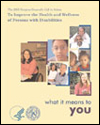
• Reward yourself when you meet your goals.
• Seek support from your friends and family members. Ask them to join you in your activities.
• Don’t give up. If you miss a day, don’t quit. Just start again.
For more tips and information on disability and health, you can download The Surgeon General's Call to Action to Improve the Health and Wellness of Persons with Disabilities: What It Means to You . (![]() 9 pages / 726 KB)
9 pages / 726 KB)
More Information and Resources
- CDC’s Disability and Health Team and Activities
- Office on Disability (US Department of Health and Human Services)
- Office of the Surgeon General (US Department of Health and Human Services)
- The Surgeon General's Call to Action to Improve the Health and Wellness of Persons with Disabilities (US Department of Health and Human Services)
Page last updated: August 13, 2007
Content source: National Center for Birth Defects and Developmental Disabilities
Content owner: National Center for Health Marketing
URL for this page: www.cdc.gov/Features/Disabilities

